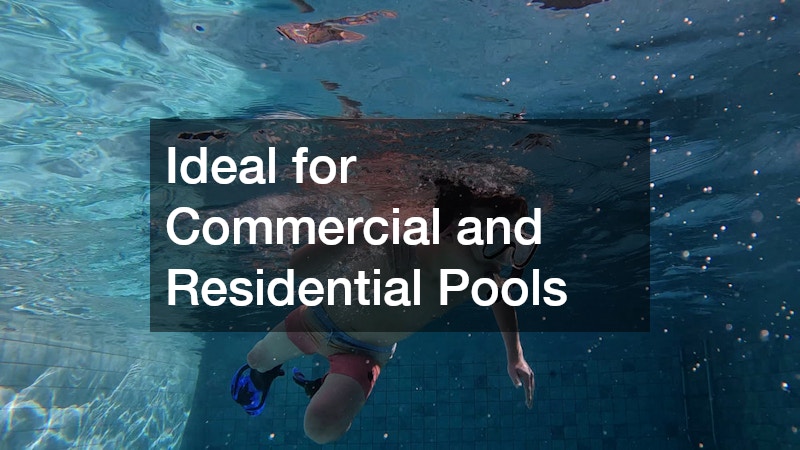Maintaining a clean and chemically balanced swimming pool is essential for both swimmer safety and the longevity of the pool itself. However, over time, minerals and contaminants build up in pool water, often prompting homeowners to drain and refill the pool entirely. This process can waste thousands of gallons of water—an environmental concern, especially in drought-prone regions. Fortunately, reverse osmosis offers a smarter, eco-friendly alternative. In this article, we explore how reverse osmosis pool service has emerged as a sustainable solution to pool drainage waste.
Why Pool Water Becomes Problematic Over Time
Pool water may appear clear and clean on the surface, but beneath that shimmering surface lies a complex balance of minerals, chemicals, and debris. Over time, minerals like calcium, magnesium, and salt accumulate in the water. This buildup is referred to as Total Dissolved Solids (TDS). As TDS levels rise, the pool becomes more difficult to manage. Water clarity decreases, algae blooms become more frequent, and chemical effectiveness is reduced.
Traditionally, when TDS reaches unmanageable levels, pool owners are advised to drain and refill the pool. This not only wastes tens of thousands of gallons of water but also increases the risk of pool structure damage due to shifting hydrostatic pressure. Draining may temporarily fix the water quality, but it also places stress on environmental resources and leads to unnecessary waste.
What Is Reverse Osmosis Pool Service?
Reverse osmosis pool service is a process that filters and purifies existing pool water without the need to drain the pool. Using specialized mobile filtration equipment, this service pumps the pool water through a semi-permeable membrane that removes unwanted contaminants such as TDS, cyanuric acid, nitrates, phosphates, calcium, and even some bacteria and viruses.
The purified water is then returned to the pool, while the concentrated waste is safely discharged in minimal volume. Unlike traditional pool draining, reverse osmosis allows pool owners to keep the majority of their water while still achieving water quality comparable to a fresh fill. This makes it a sustainable and efficient option for maintaining high water standards year-round.
How Reverse Osmosis Works
The core of reverse osmosis technology lies in its use of pressure and filtration. The system pushes water through a specially designed membrane that traps particles based on size and charge. Clean water molecules pass through the membrane, while larger contaminants are left behind.
During reverse osmosis pool services this process is repeated continuously until the pool water reaches optimal levels. Most services can treat an entire residential pool in 12 to 24 hours, depending on size and severity of contamination. Unlike standard draining, RO does not expose the pool surface to air and sun, which can lead to surface cracks or fading.
Environmental Benefits of Reverse Osmosis Pool Service
Perhaps the most compelling argument for using hiring a reverse osmosis pool service is the impact on water conservation. The average swimming pool holds between 15,000 and 25,000 gallons of water. Draining and refilling that amount of water, especially in arid regions, is both wasteful and often restricted by local regulations.
- Water conservation: Reverse osmosis typically saves 85–90% of existing pool water by recycling it through the system rather than replacing it entirely.
- Reduced chemical use: With cleaner water, pool owners often require fewer chemicals to maintain balance, which reduces the environmental impact of pool maintenance.
- Minimized runoff: Draining a pool can cause excess water to enter storm drains or surrounding areas, potentially carrying chemicals into natural water systems. RO minimizes this risk.
- Preservation of local resources: Communities experiencing drought or water bans benefit greatly from pool owners choosing reverse osmosis instead of full draining.
In an age where water sustainability is a growing concern, reverse osmosis provides a much-needed alternative for responsible pool ownership.
Better for Your Pool and Your Budget
Aside from the environmental perks, reverse osmosis offers long-term value for pool owners. Draining a pool exposes surfaces to potential damage, such as cracking from sun exposure or shifting ground conditions. Additionally, refilling a pool often requires a significant investment in balancing pH, chlorine, stabilizers, and other chemicals to recondition the water.
With the help of a reverse osmosis pool service, the water remains in the pool throughout the treatment process, preserving water levels and temperature. Once the service is complete, most owners can resume swimming within a few hours, and the need for chemical adjustment is minimal. Over time, this reduces the frequency of expensive chemical purchases and helps extend the life of pool equipment by reducing scaling and buildup.
When Should You Consider Reverse Osmosis?
While reverse osmosis is not necessary for every pool, it is ideal for those showing signs of elevated TDS or mineral buildup. Some indicators include:
- Cloudy or dull pool water despite regular chemical treatment
- Persistent algae growth or difficulty maintaining chlorine levels
- White scale buildup on tile, surfaces, or equipment
- High calcium or cyanuric acid levels shown in water tests
Most pool professionals recommend water testing at least once a year to monitor these levels. If your pool’s chemistry becomes difficult to manage, reverse osmosis can help restore balance without the disruption of draining and refilling.

Ideal for Commercial and Residential Pools
While reverse osmosis pool services are gaining popularity among residential pool owners, it’s also a smart choice for hotels, resorts, gyms, and apartment complexes with commercial pool facilities. These larger pools require constant attention and must adhere to strict health codes, making consistent water quality crucial. By using RO, facility managers can reduce downtime, save water, and meet sanitation standards more effectively.
The convenience of mobile reverse osmosis systems means the service can be performed with minimal interference to guests or tenants, making it an ideal maintenance solution for busy environments.
A Cleaner Pool With a Smaller Footprint
Hiring a reverse osmosis pool service is more than a high-tech solution to a common pool problem—it’s a sustainable choice for the future. As concerns about water conservation and environmental responsibility grow, pool owners must look for smarter ways to maintain their investments. Reverse osmosis treats existing water instead of wasting it, offering a cleaner, safer, and more eco-conscious alternative to traditional pool drainage.
If your pool is struggling with mineral buildup, cloudy water, or unmanageable chemical levels, consider reaching out to a certified reverse osmosis provider. With better water quality, lower chemical use, and a reduced environmental impact, you’ll enjoy a pool that’s healthier for both you and the planet.

